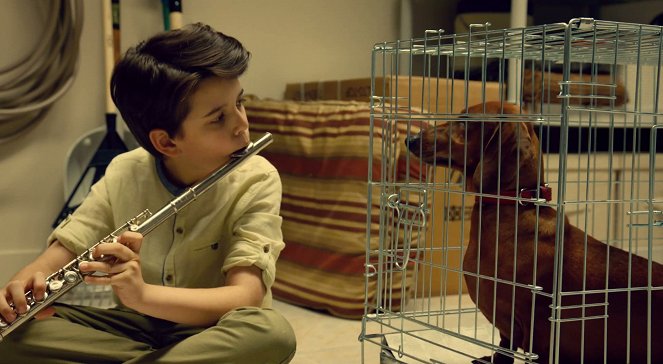Director:
Todd SolondzGuión:
Todd SolondzCámara:
Edward LachmanMúsica:
James LavinoReparto:
Danny DeVito, Ellen Burstyn, Greta Gerwig, Julie Delpy, Keaton Nigel Cooke, Zosia Mamet, Kieran Culkin, Tracy Letts, Samrat Chakrabarti, Michael James Shaw (más)Sinopsis(1)
Wiener-Dog cuenta varias historias sobre personas cuyas vidas se ven inspiradas o cambian gracias a un perro salchicha que al parecer difunde un cierto tipo de consuelo y alegría. El mejor amigo del hombre empieza enseñando a un niño varias retorcidas lecciones vitales antes de ser acogido por una veterinaria llamada Dawn Wiener. Dawn se reencuentra con alguien de su pasado y emprende un viaje en coche recogiendo por el camino a varios mariachis deprimidos. Después el perro salchicha se encuentra con un profesor de cine a la deriva y con una amargada anciana y su caprichosa nieta, todos necesitados de algo. (San Sebastian International Film Festival)
(más)Reseñas (2)
“We’re all going to die.” Todd Solondz has made another one of his heart-warming comedies about depression, loneliness and cancer. This time, the characters try in vain to conform to the norm of having a positive approach to life and achieving the American Dream despite paralysing doubts about their own existence. As evidence of how little he cares for the film’s characters, he makes the story’s protagonist a dachshund who is a “motherfucker” to one owner, “Doo Dee” (“like shit”) or ”Cancer” to another (but, unlike actual cancer, not indestructible). The director doesn’t really care much for the bitch either. Like the donkey in Bresson’s Au Hasard Balthazar, the animal serves as a means of reflection on the human (in)capacity for empathy. On the one hand, there are characters whose emotional attachment to the dachshund causes them pain and, on the other hand, people who are emotionally numb. For both groups, the animal is a catalyst that prompts them to express their pent-up frustration with married life, fear of their own mortality and their attitude toward society. The personal happiness that everyone should achieve in the spirit of a bright and boisterous commercial (and many other debilitating products of pop culture) is fleeting and every moment of joy is followed by punishment, for example in the form of life-threatening diarrhoea that devalues the parquet floor. Thanks to the different ages of the characters, we also see that the situation does not improve as the years go by. As we grow older, we have – in Solondz’s view – only more health problems and regrets about the decisions we have made, whose consequences cannot be reversed. What diminishes is our understanding for others. For example, for ambitious young filmmakers with a need to express themselves even though they have nothing to say. Other than the relay narrative, which, besides Bresson, has also been used before (and with a different effect) by Richard Linklater (Slacker) and Steven Spielberg (War Horse), and is therefore not a radical departure from classic narrative conventions as we saw in Palindromes, this is a classic Solondz film with long static shots, ironic use of classical music and strikingly pointed dialogue (“What's in Ohio? – Crystal meth”). The rules governing what can be said and shown in an American comedy with respect to the overly sensitive viewers who love dogs and other animals more than people are still broken in the same way, but not so predictably that the film doesn’t manage to throw you off balance a few times (for example, by going into detail with a story about an aggressive dog of a certain name that raped squirrels). 80%
()
An interesting film with interesting characters who are connected by the fact that a dachshund, after which the whole film is named, has come into their presence. Surrounding the dachshund are acting legends as well as young talents, all showing that this film about people is really good. The finale is quite harsh, just like life can be harsh.
()

